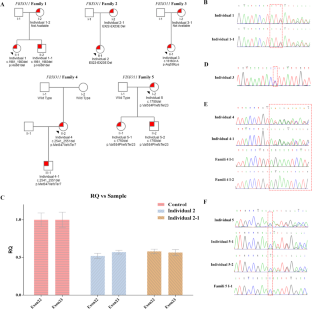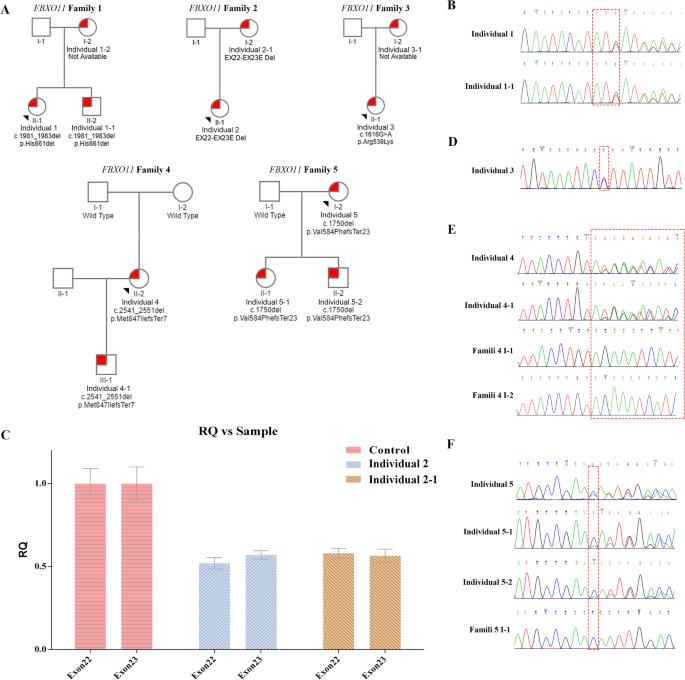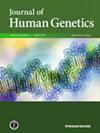FBXO11变体与中国患者的智力残疾和不同临床表现有关。
IF 2.6
3区 生物学
Q2 GENETICS & HEREDITY
引用次数: 0
摘要
F-盒蛋白11(FBXO11)是F-盒蛋白家族的成员之一,最近被证实与伴有畸形面容和行为异常的智力发育障碍(IDFBA,OMIM:618089)有关。本研究收集了来自5个中国ID家族的12名智力障碍患者,并进行了全外显子组测序(WES)、桑格测序(sanger sequencing)和RNA测序(RNA-seq)。几乎所有受试者都表现为轻度至重度智力障碍(12/12)、全面发育迟缓(10/12)、言语和语言发育迟缓(8/12),并伴有一系列交替特征,包括体重增加(7/12)、身材矮小(6/12)、癫痫发作(3/12)、视力减退(4/12)、肌张力低下(1/12)、幻听和幻觉(1/12)。值得注意的是,并非所有患者都出现了畸形。WES分析显示了5个新的FBXO11变异,包括一个框架内缺失变异、一个错义变异、两个框架移位变异和FBXO11(22-23外显子)的部分缺失。RNA-seq表明,FBXO11外显子22-23的缺失会导致一种新的mRNA结构。保守性和蛋白质结构预测显示了这些变异的有害影响。DEGs 分析显示,6 个受影响个体共有 148 个差异表达基因,这些基因主要与肌肉和免疫系统基因相关。我们的研究首次报道了中国人中与FBXO11相关的IDDFBA,拓展了这一新发现的NDD/ID综合征的遗传和临床谱系。本文章由计算机程序翻译,如有差异,请以英文原文为准。


FBXO11 variants are associated with intellectual disability and variable clinical manifestation in Chinese affected individuals
F-box protein 11 (FBXO11) is a member of F-Box protein family, which has recently been proved to be associated with intellectual developmental disorder with dysmorphic facies and behavioral abnormalities (IDDFBA, OMIM: 618089). In this study, 12 intellectual disability individuals from 5 Chinese ID families were collected, and whole exome sequencing (WES), sanger sequencing, and RNA sequencing (RNA-seq) were conducted. Almost all the affected individuals presented with mild to severe intellectual disability (12/12), global developmental delay (10/12), speech and language development delay (8/12) associated with a range of alternate features including increased body weight (7/12), short stature (6/12), seizures (3/12), reduced visual acuity (4/12), hypotonia (1/12), and auditory hallucinations and hallucinations (1/12). Distinguishingly, malformation was not observed in all the affected individuals. WES analysis showed 5 novel FBXO11 variants, which include an inframe deletion variant, a missense variant, two frameshift variants, and a partial deletion of FBXO11 (exon 22–23). RNA-seq indicated that exon 22–23 deletion of FBXO11 results in a new mRNA structure. Conservation and protein structure prediction demonstrated deleterious effect of these variants. The DEGs analysis revealed 148 differentially expressed genes shared among 6 affected individuals, which were mainly associated with genes of muscle and immune system. Our research is the first report of FBXO11-associated IDDFBA in Chinese individuals, which expands the genetic and clinical spectrum of this newly identified NDD/ID syndrome.
求助全文
通过发布文献求助,成功后即可免费获取论文全文。
去求助
来源期刊

Journal of Human Genetics
生物-遗传学
CiteScore
7.20
自引率
0.00%
发文量
101
审稿时长
4-8 weeks
期刊介绍:
The Journal of Human Genetics is an international journal publishing articles on human genetics, including medical genetics and human genome analysis. It covers all aspects of human genetics, including molecular genetics, clinical genetics, behavioral genetics, immunogenetics, pharmacogenomics, population genetics, functional genomics, epigenetics, genetic counseling and gene therapy.
Articles on the following areas are especially welcome: genetic factors of monogenic and complex disorders, genome-wide association studies, genetic epidemiology, cancer genetics, personal genomics, genotype-phenotype relationships and genome diversity.
 求助内容:
求助内容: 应助结果提醒方式:
应助结果提醒方式:


